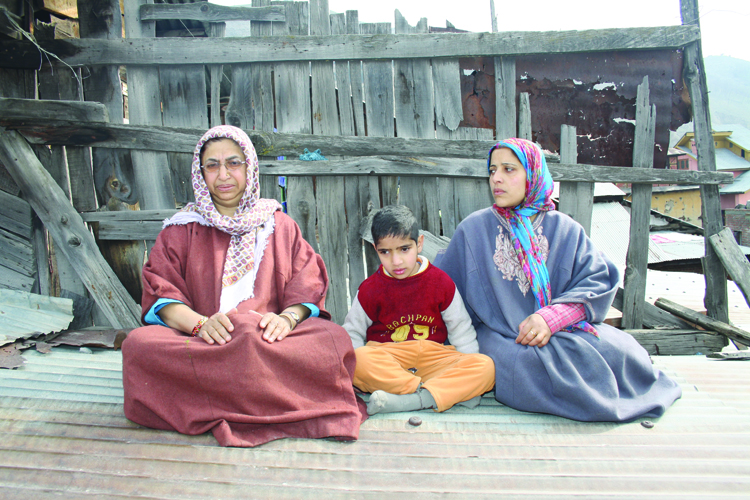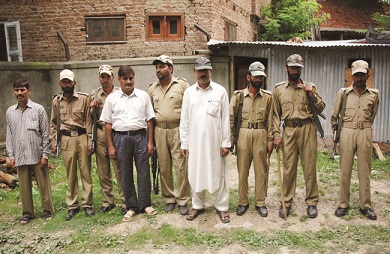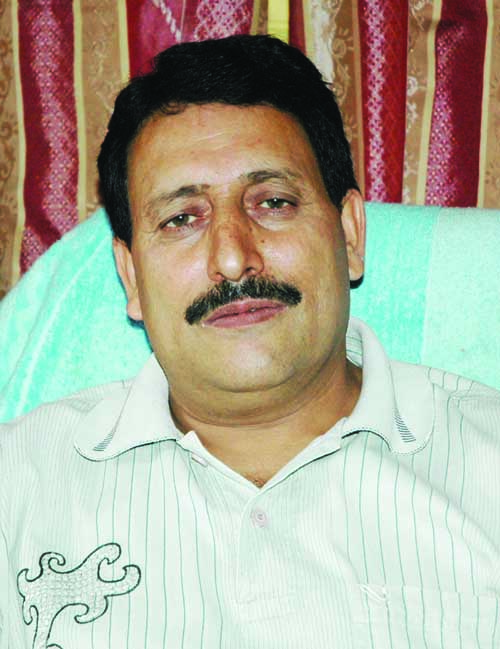They fought India’s war in Kashmir and paid with their lives. Now their families, ignored by government and ostracised by the society, fight a tougher battle – for survival. ZUBAIR A DAR reports the story, a social reality in today’s Kashmir

The boy cannot see. Irfan lost his sight in an accident, blinding him for life. His mother Rubi chooses not to see. Four years ago, her ‘renegade’ husband Aijaz Ahmad Turrey fell to the bullets of an assassin. She didn’t know her husband is dead. She didn’t even see her husband before burial. She was away in Amritsar where she had taken her blind son for treatment. She returned. And her journey of grief and loneliness began from the graveyard itself: there was no one to share her pain. That evening, she cried alone. The taboo of being a ‘renegade’s’ widow had immediately led to an untold social boycott. Soon she felt the hateful stares of neighbours and even the relatives were reluctant to visit. A strange silence had gripped her life and she decided to cage herself inside her home – a brick and cement box where three rooms stand over each other with no space even to breathe.
Rubi, 27, is not alone. Like hundreds of families of slain renegades, her story of pain and loneliness is a harsh but hidden social reality of Kashmir. Unlike militants, their deaths were mourned only by the close family. For people, they were traitors to the cause. But even after their violent deaths, the society didn’t forgive. The government too didn’t care. For them, counter-insurgents were nothing more than pawns in a larger battle where they came handy to do the dirty job outside the realm of law. They were not soldiers. Thus a payment of one lakh rupees as ex-gratia by the administration became the price of the life of each of these young men.
Rubi’s story starts from a nearby house in Janglat Manidi in Islamabad town where she lived with her parents. Turrey, a cousin, had joined counterinsurgents. The families decided to marry the two in 1996. “He was promised that he would get a job in police. My mother said that a government job was a secure earning opportunity for a lifetime and persuaded me to marry him,” says Rubi. Rubi chose to tie the knot.
Like Rubi, her husband Aijaz Ahmad Turrey too had made a choice, a hard one. In 1995, he joined the government sponsored militia, Ikhwan-ul-Muslimeen, a militant outfit that had switched sides to fight militancy in Kashmir. Many of the counterinsurgents had gone across for arms training but government allowed them to operate as against militants. They were largely controlled by their own commanders. The government paid Turrey rupees 1,500 a month. Ikhwan commanders promised assimilation in state’s police force. Years after Turrey’s death, the family – Rubi, her two children Irfan (6) and Ubaid (10) and Turry’s mother Habla – fail to mix with people in their hometown, Islamabad, where men like Turrey controlled the affairs for many years.
“I do not go anywhere now, nowhere except for my parents place. No one comes to visit us except them,” says Rubi. “I have no job.” To earn a living after her husband’s death, she roasted cattle heads that would clear them of hair. The trader shifted his business and Rubi was left jobless. “We do not go seeking jobs any more. We dread a reaction,” she says.
Like Rubi, at least a hundred families in south Kashmir Islamabad district have lost their male heads to counter insurgency. In mid-nineties, at least 250 men across south Kashmir’s Islamabad district joined the anti-insurgency group. A sketchy record maintained by their ‘commander’ Kuka Parray’s son Imtiyaz Parray shows that their total number across Kashmir was 800. Their job was to fight a battle that security forces were finding difficult to handle. The period is considered to be one of the worst in terms of human rights violations. At least 300 of them have been killed in retaliatory attacks by militants. Their families now face an untold social sanction.
Men like Turrey were lured by jobs and a security cover against harassment – from militants as well as security forces. Why would Turrey need security? The armed rebellion had necessitated it for every Kashmiri boy with militant ambitions. Turrey was no different. Swept by the wave that drove thousands of young boys in Kashmir to join militant outfits, Turrey left home one night in early nineties to join Jammu and Kashmir Liberation Front.
His mother, Habla, calls it KLF. She does not remember the year or date, all she can tell is that Turrey was ‘an innocent boy then.’ “Only 40 days had passed since his father’s death,” Habla recalls.
“His friends told me that he had gone across the border for training. But he returned home some nights later. Still the army tortured him twice. He tried to stay home afterwards, but HM (militants) would raid our house looking for him. I would tell him to run to his grandmother’s,” says Habla. Turrey was not married then. But the pressure was telling upon his behaviour, his mother says. Then one day, he decided to join Ikhwan and worked closely with police and security forces in fighting militants.

But the married life was more of an affliction than a respite. “The Ikhwan camp was just outside our home. Still he came home only once a week, that too at night. He had compulsions.”
While Turrey joined to ‘save himself’, others just wanted to vent the disappointment in their lives through the barrel of their guns. Nisar Ahmad Mir, another renegade, was killed in the same militant attack that killed Turrey. “A woman wearing burqa (veil) came to their camp with the news that an IED had been planted in the market near Janglat Mandi. The two rushed to the spot where militants fired upon them,” says Jehangir Khan, an erstwhile ‘commander’ from village Rampore in neighbouring Mattan area. Khan now heads the left over counterinsurgent group. Unlike Turrey, Mir had joined to escape an emotional ordeal. His wife, whom he married after a long love affair, had died of a brain haemorrhage. “She was beautiful. You would not find her match in entire Kashmir,” says Mir’s mother, Taja. “After her death, my son just wanted to run away from home. I told him not to join Ikhwan. So many people tried to persuade him, but he wouldn’t listen.”
At the family’s mud and brick home in Mir Danter locality of Islamabad town, testimonies of Mir’s romance are collected in an album. One of the photos shows Mir kissing his wife, Mehbooba – an expression few in Kashmir would like to capture in camera and make public. After joining the renegades, Mir rarely came home. “He did not even mind to care for his three children,” Taja says. In their dark bedroom in the old house they share with other relatives, Mir’s children – Zubair, Faisal and Azra – live with their 70-year-old grandmother. Zubair, the eldest, quit education after ninth class and now works as a labourer – in the fields, in construction – anywhere and everywhere he finds an opportunity to earn the family a meal. Faisal and Azra study in government schools where fees are generally exempted.
Government paid an ex-gratia of Rupees one lakh to the family after Mir’s death. Taja refuses to accept the money. “I better beg. How could I spend the blood money to buy groceries for feeding these children,” she says. “I have put it in an account. When they (children) grow up may be they use it then.”
But the pain of loneliness refuses to go. Taja says that her other two sons live separately. “No one comes here. No one except Khuda,” she says. Her eyes sink deep into the sockets as she speaks.
“My husband died 20 years ago. I lived and toiled for my children. Now I am alone,” she says, as the wrinkles on her face crease to run deeper. Her decaying teeth are barely visible when she speaks. She doesn’t complain about relatives alone, she is hurt the way government has treated her family after her son’s death. A few weeks ago, Taja heard that Zubair’s name appeared in the list of people whom the government plans to give jobs. She went to check at District Development Commissioner’s office. “No one tells me anything there. I just hope he gets a job. He has a sister and a brother to take care of. How long would I live,” Taja says. “If my son would not have joined Ikhwan, we would have been better off.” Like Taja, Rubi too aspires to get a job. She wants to remind the government that her husband had laid down his life for them. “I have filed a job application in the DC’s office. They say they would pay me more money,” Rubi says. “But I want a job. I am even ready to work as a peon at some office.” Rubi aspires that the job will help her overcome her solitude besides helping her feed her children and mother-in-law. She says that the circumstances necessitate that.

Rubi’s mother-in-law insists her to marry again. “The boy could live with us here and take care of all of us,” Habla says. But Rubi doesn’t agree. She fears the marriage would be a disappointment. “The person I marry may start digging into my past. I better take care of my children alone,” she says. “My husband would often say that he would quit the force if he doesn’t get a proper job.
That couldn’t happen. Why dream about things that just are not possible?” she regrets. Other counter-insurgents, who survived the 13 years of war against militants, regret too. They feel guilty of killing their own people, some of whom they knew closely.
Jahangir Khan says that they were “used – to fight their own people and then disposed off”. Jahangir now lives in a Kashmiri Pandit’s house in Islamabad town. He says that he is living as a migrant in his own community because no one owns him. “We were exploited by the security forces, government as well as our own commanders,” he says. “We gave our lives. We brought down the militancy, floated a political party (Awami League) and announced our participation in the elections in 1996. The political leaders who now oppose us were hiding in other countries then,” he says. “What did we get in return?”
Khan remembers the beginning of the counter insurgency movement. “The commanders, especially Liyaqat, Nana, Tahir would meet army officers and then tell their boys what the strategy was. To keep them going, they would promise jobs and money,” he says. “No one now cares to check how they live and feed their families. Every boy who survived now feels to have betrayed his own people. We killed those whom we knew personally. There were excesses as well in certain cases. But who made us do that,” Khan says.
The sketchy record that Jahangir maintains shows 100 counter-insurgents were killed by militants in different attacks in Islamabad and Kulgam areas. “But no family member of the victim has been provided a job,” he says. Out of those who survived, around 50 have been adjusted in the Territorial Army. Some still work with police as SPOs and are paid 3000 rupees a month. “Others are hiding. Few who dare, go out, work as vendors on pavements,” Khan says. Comparing the lives of ordinary renegade and their commanders, Khan says that unlike the foot soldiers of Turrey’s rank, commanders amassed huge money out of counter insurgency. “At Taqiya Beram Shah, Liyaqat lived in a hut. Now he has made crores. He went to Gujarat for relief distribution. Did he distribute some relief to the boys who fought with him?” Khan says.
In total, Territorial Army has accommodated 250 counter-insurgents. Few more have been assimilated in CRPF. But the families of slain ‘renegades’ who were killed are finding it hard to survive amid ostracism and poverty. Each day Rubi wakes up, life appears to her a punishment for decisions she never took.















